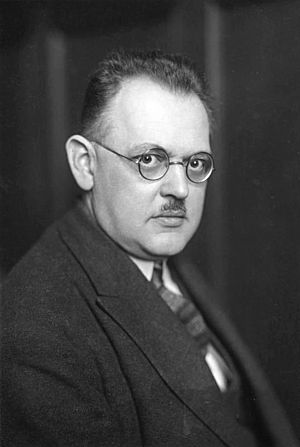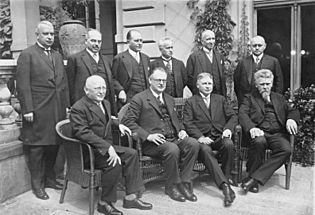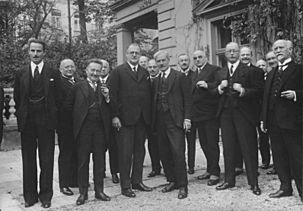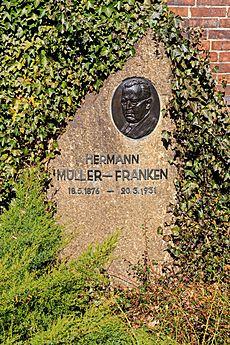Hermann Müller (politician) facts for kids
Quick facts for kids
Hermann Müller
|
|
|---|---|

Müller in 1928
|
|
| Chancellor of Germany (Weimar Republic) |
|
| In office 28 June 1928 – 27 March 1930 |
|
| President | Paul Von Hindenburg |
| Preceded by | Wilhelm Marx |
| Succeeded by | Heinrich Brüning |
| In office 27 March 1920 – 21 June 1920 |
|
| President | Friedrich Ebert |
| Deputy | Erich Koch-Weser |
| Preceded by | Gustav Bauer |
| Succeeded by | Constantin Fehrenbach |
| Foreign Minister of Germany | |
| In office 21 June 1919 – 26 March 1920 |
|
| President | Friedrich Ebert |
| Chancellor | Gustav Bauer |
| Preceded by | Ulrich von Brockdorff-Rantzau |
| Succeeded by | Adolf Köster |
| Member of the Reichstag (Weimar Republic) |
|
| In office 1920–1931 |
|
| Constituency | Franken |
| (German Empire) | |
| In office 1916–1918 |
|
| Constituency | Breslau 11 |
| Member of the German National Assembly | |
| In office 6 February 1919 – 21 May 1920 |
|
| Constituency | Breslau |
| Personal details | |
| Born |
Hermann Müller
18 May 1876 Mannheim, German Empire |
| Died | 20 March 1931 (aged 54) Berlin, Weimar Republic |
| Political party | Social Democratic Party |
| Spouses |
|
| Children | 2 |
Hermann Müller (born May 18, 1876 – died March 20, 1931) was an important German politician. He was a member of the Social Democratic Party (SPD). Müller served as Germany's foreign minister from 1919 to 1920. He was also the Chancellor of Germany twice, first in 1920 and again from 1928 to 1930. These were important years for Germany, known as the Weimar Republic. As foreign minister, he was one of the German leaders who signed the Treaty of Versailles in 1919. This treaty officially ended World War I.
Contents
Early Life and Education
Hermann Müller was born in Mannheim, Germany, on May 18, 1876. His father, Georg Jakob Müller, sold wine. His mother was Karoline Vogt. Hermann went to school in Mannheim and later in Dresden.
In 1892, his father passed away. This meant Müller had to leave school because his family needed money. He then started an apprenticeship, which is like learning a job by working. He worked in Frankfurt and Breslau. In 1893, he joined the Social Democratic Party of Germany (SPD). Müller was the only German chancellor who did not belong to any religion.
Political Journey
Joining the SPD and the Reichstag (Before 1918)
From 1899 to 1906, Müller worked as an editor for a socialist newspaper. He was also a member of the local city council in Görlitz. In 1906, he joined the national board of the SPD. Müller was known for being calm, hardworking, honest, and smart. He became a "centrist" in the party, meaning he tried to find a middle ground.
Müller was good at foreign languages. This made him the SPD's representative at international meetings of socialist parties. In July 1914, he went to Paris to talk with French socialists. They wanted to agree on how to handle war loans, but they couldn't reach a deal. Soon after, World War I began.
During the war, Müller supported a political truce in Germany. This meant different political parties agreed to work together for the country. He also helped manage the party's newspaper to avoid it being banned by the military. Müller was a member of the Imperial Reichstag (Germany's parliament) from 1916 until the end of the German Empire in 1918.
Revolution and National Assembly (1918 to 1919)
After World War I, Germany went through a revolution. Müller was part of a council in Berlin that represented workers and soldiers. He supported holding elections for a new national assembly. This assembly would create a new government for Germany.
In January 1919, Müller was elected to the Weimar National Assembly. When Friedrich Ebert became president, Müller was chosen to help lead the SPD party. He became the party's main public representative. From 1919, he also led the SPD group in the National Assembly and later in the Weimar Republic Reichstag. He even changed his name to Müller-Franken to avoid confusion with other politicians named Müller.
First Time as Chancellor (1920)
After the previous leader resigned in June 1919, Müller was asked to become the head of government but he said no. Instead, he became the foreign minister. In this role, he traveled to Versailles, France. There, on June 29, 1919, he signed the Treaty of Versailles for Germany.
In March 1920, after a failed attempt to overthrow the government (the Kapp Putsch), Müller accepted the offer to become chancellor. He formed a new government with the SPD, the German Democratic Party, and the Centre Party.
Under his leadership, the government stopped left-wing uprisings. They also worked to disarm private armed groups, as demanded by other countries. Müller's government also passed important social reforms:
- A system was set up to help people disabled by war.
- Employers had to hire Germans with disabilities.
- A new law created a common four-year primary school for all children.
- Benefits for unemployed people were improved.
- Civil servants (government workers) received better pay.
- A national office was created to help with jobs and unemployment insurance.
- Laws were passed to help people with injuries and disabilities get back to work.
- A law encouraged people to own their own homes.
- Rules were made to protect tenants from unfair rent increases.
- Orders were introduced to protect women working in dangerous jobs.
Müller was chancellor only until June 1920. In the next election, the SPD lost many votes. This led to a new government being formed without the SPD in charge. Müller was against working with some other parties, like the German People's Party, because he felt they didn't fully support the new republic.
SPD in Opposition and Coalitions (1920 to 1928)
While the SPD was not leading the government, Müller supported Germany's foreign policy. He wanted Germany to join the League of Nations, an international organization for peace. He also wanted Germany to have closer ties with Western countries. He did not like the Soviet Union's government system.
Müller believed that Germany should work with Western powers for its future. He warned against relying too much on economic help from the Soviet Union. He thought only the United States could truly help Europe rebuild after the war.
In 1923, when France occupied the Ruhr region and Germany faced hyperinflation, Müller brought the SPD into a "grand coalition" government. This was a broad alliance of parties led by Gustav Stresemann. However, disagreements over economic and social policies caused the SPD to leave the coalition in November 1923.
During these years, the SPD supported a policy of reconciliation with Western powers. This included agreements like the Locarno Treaties, which helped settle Germany's western borders. Germany also joined the League of Nations. The SPD did not participate in another government until June 1928.
Second Time as Chancellor (1928 to 1930)

In 1928, the SPD won the elections. Hermann Müller became chancellor again. His new government was a coalition of several parties. It was hard for the parties to agree on policies. The government mostly stayed together because Müller and Foreign Minister Gustav Stresemann respected each other. Stresemann died in October 1929, which made things harder.
Müller's government faced big challenges. They had to deal with arguments over building a new warship. They also had to manage a huge lockout of workers in the Ruhr region.
A major goal was to negotiate better terms for Germany's war reparations (payments to other countries). Müller led the German delegation to the League of Nations. By January 1930, his government successfully negotiated a reduction in payments (the Young Plan). They also got a promise for Allied forces to leave the Rhineland by May 1930.
Müller's government also dealt with problems with Poland and difficult relations with the Soviet Union. The parties in his coalition struggled to agree on how to fund unemployment insurance, especially as the Great Depression began. Müller became very ill, which weakened his ability to lead.
The coalition finally broke apart over budget issues. Müller was willing to compromise, but his own party refused. The president, Paul von Hindenburg, would not give Müller's government special emergency powers. Because of this, Müller and his cabinet had to resign on March 27, 1930.
During Müller's second time as chancellor, more reforms were made:
- A national unemployment insurance system was created in 1928.
- Midwives and musicians became covered by a pension plan.
- Accident insurance was expanded to include more work-related diseases.
- A special pension was introduced for unemployed people aged 60 and over.
Later Life and Death
After resigning as chancellor, Müller mostly stepped away from public life. In the elections of September 1930, the Nazi Party gained many votes. Müller urged his party to support the new government, even if they weren't part of it.
Hermann Müller died on March 20, 1931, in Berlin, after an operation. His death was a big loss for the Social Democrats. He is buried at the Zentralfriedhof Friedrichsfelde cemetery in Berlin.
Family Life
In 1902, Müller married Frieda Tockus. They had a daughter named Annemarie in 1905. Sadly, Frieda died a few weeks later. Müller remarried in 1909 to Gottliebe Jaeger. They had a daughter named Erika the following year.
Images for kids
-
Müller's cabinet, June 1928. Standing, left to right: Hermann Dietrich, Rudolf Hilferding, Julius Curtius, Carl Severing, Theodor von Guérard, Georg Schätzel. Sitting: Erich Koch-Weser, Hermann Müller, Wilhelm Groener, Rudolf Wissell
See also







